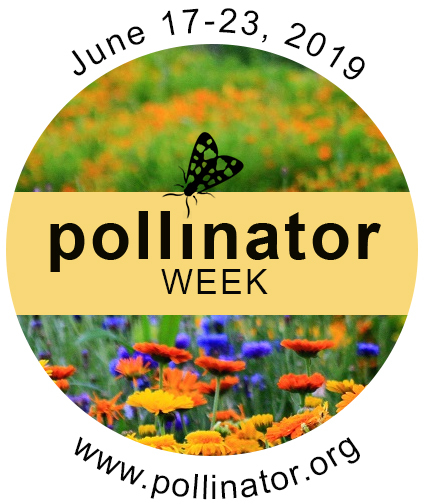
National Pollinator Week is a time to celebrate pollinators and spread the word about what you can do to protect them. Twelve years ago the U.S. Senate’s unanimous approval and designation of a week in June as “National Pollinator Week” marked a necessary step toward addressing the urgent issue of declining pollinator populations. Pollinator Week has now grown into an international celebration of the valuable ecosystem services provided by bees, birds, butterflies, bats and beetles.
Pollination Fast Facts
What is pollination?
Pollination is a vital stage in the life cycle of all flowering plants. When pollen is moved within a flower or carried from one flower to another of
the same species it leads to fertilization. This transfer of pollen is necessary for healthy and productive native & agricultural ecosystems.
- About 75% of all flowering plant species need the help of animals to move their heavy pollen grains from plant to plant for fertilization.
- About 1,000 of all pollinators are vertebrates such as birds, bats, and small mammals.
- Most pollinators (about 200,000 species) are beneficial insects such as flies, beetles, wasps, ants, butterflies, moths, and bees.
Why are pollinators important?
Pollinators are often keystone species, meaning that they are critical to an ecosystem. The work of pollinators ensures full harvests of crops and contributes to healthy plants everywhere.
- An estimated 1/3 of all foods and beverages is delivered by pollinators.
- In the U.S., pollination produces nearly $20 billion worth of products annually.
How you can help.
- Reduce your impact. Reduce or eliminate your pesticide use, increase green spaces, and minimize urbanization. Pollution and climate change affect pollinators, too!
- Plant for pollinators. Create pollinator-friendly habitat with native flowering plants that
supply pollinators with nectar, pollen, and homes. For information on what to plant in your
area, download a free eco-regional guide online at www.pollinator.org. - Tell a friend. Educate your neighbors, schools, and community groups about the
importance of pollinators. Host a dinner, a pollinated food cook-off or other event and invite
your friends. - Join the Pollinator Partnership. Go to www.pollinator.org and click on “Get Involved.” Be
part of a growing community of pollinator supporters.
